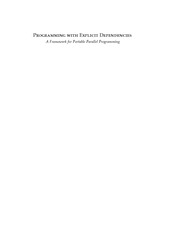Programming with Explicit Dependencies. A Framework for Portable Parallel Programming
Doctoral thesis
Permanent lenke
https://hdl.handle.net/1956/4771Utgivelsesdato
2011-05-23Metadata
Vis full innførselSamlinger
Sammendrag
Computational devices are rapidly evolving into massively parallel
systems. Multicore processors are already standard; high performance
processors such as the Cell/BE processor, graphics processing units
(GPUs) featuring hundreds of on-chip processors, and reconfigurable
devices such as FPGAs are all developed to deliver high computing power.
They make parallelism commonplace, not only the privilege of expensive
high-end platforms. However, classical parallel programming paradigms
cannot readily exploit these highly parallel systems. In addition, each
hardware architecture comes along with a new programming model and/or
application programming interface (API). This makes the writing of
portable, efficient parallel code difficult. As the number of processors
per chip is expected to double every other year or so, entering parallel
processing into the mass market, software needs to be parallelized and
ported in an efficient way to massively parallel, possibly
heterogeneous, architectures. This work presents the foundations of a
high-level hardware independent parallel programming model based on
algebraic software methodologies. The model addresses two main issues of
parallel computing: how to map efficiently computations to different
parallel hardware architectures at a high and easy to manipulate level,
and how to do this at a low development cost, i.e., without rewriting
the problem solving code. The uniqueness of this framework is two-fold:
1.) it presents the user with a programmable interface especially
designed to allow the user to express the data dependency information of
the computation as real code, in terms of a data dependency algebra
(DDA). Hence data dependencies are made explicit in the program code.
The DDA interface consists of a generic point type, a generic branch
index type, and two sets of generic function declarations on these
types, requests and supplies, which are duals of each other. 2) it gives
direct access, within a unified framework, to various hardware
architectures’ communication layouts, or their APIs, at a high-level.
This allows the embedding of the computation to be fully controlled by
the programmer at a high and easy to manipulate level. In turn, this
saves the user from the hassle of learning “the dialect” of each
targeted hardware architecture in case. Direct access to aspects of the
hardware model is needed by some architectures, e.g., GPUs, FPGAs.
However, the model is fully portable and not tied to any specific
processor or hardware architecture, due to the modularisation of the
data dependencies. The inherent properties of DDAs lead to various
execution models, depending on the chosen hardware architecture, and
provide full control over the execution models’ computation time. Since
spatial placements of computations are controlled from DDAs, this gives
full control over space usage as well, whether sequential or parallel
execution is desired. In the parallel cases, DDAs give full control over
processor and memory allocation, and communication channel usage, while
still at the abstraction level of the source program.
Opphavsrett
The authorCopyright the author. All rights reserved
